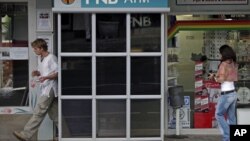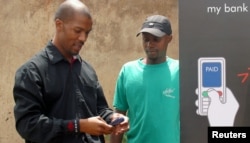JOHANNESBURG —
As South Africa's economy has grown, so has consumer debt. Forty-seven percent of South Africans with credit have impaired records. A substantial amount of that bad credit is tied up in high-interest, unsecured loans.
Imagine you want to get a quick infusion of cash, but your income isn't enough and you don't have the savings.
Enter the unsecured loan. Without money down, you can get an unsecured loan, meaning you're taking out money without collateral.
For the average consumer, this kind of loan is tempting but can be a handful once repayment begins.
Louisa Hetisani, manager for Credit Information & Research at the National Credit Regulator, said these loans pack a high interest rate.
"Currently the highest rate that can be paid for these unsecured personal loans is higher than any other kind of credit," said Hetisani. "It's 31 percent."
Since 2007, the number of people using credit in South Africa has increased from 16.8 million to 19.6 million.
The amount of impaired credit records - people who are behind on payments by at least three months - has increased from 36 percent to 47 percent over the same time.
While mortgages are paid on schedule about 90 percent of the time, unsecured loans are paid on schedule only about 75 percent of the time.
Clark Gardner is CEO of Summit Financial Partners, which helps consumers become financially responsible. He said, "It is a function of an ignorant consumer that doesn't understand the consequences of credit because their parents never had it and they never thought about how to manage credit responsibly. And the rest is pure opportunism - preying on those ignorant consumers."
These loans, because they don't require money down, are most attractive to lower income groups.
More than 60 percent of these loans are given to consumers who make less than 10,000 rand or about $1,100 a month, according to a report from South Africa's Credit Bureau Monitor.
Both the Credit Bureau Monitor and Summit Financial have lobbied on behalf of consumers for more government oversight on the processing of unsecured loans.
Hetisani said the loans aren't necessarily bad, but need to have more safeguards for consumers. "We understand that consumers need to access credit in order for them to improve their lives," she said.
"All we are saying is both credit granting and credit use should be done in a responsible manner," she added. "We have come out with some recommendations, which we have made. One of them is, for example, introducing affordability assessment guidelines, but that is still in the pipeline."
In the meantime, while many banks are still offering such loans, some are cutting down on them. African Bank, known as Abil, and Capitec Bank, two banks which have granted many unsecured loans, have said that they will be more selective about those who qualify.
Meanwhile, the Treasury and Banking Association of South Africa are looking at measures to promote more responsible lending.
Imagine you want to get a quick infusion of cash, but your income isn't enough and you don't have the savings.
Enter the unsecured loan. Without money down, you can get an unsecured loan, meaning you're taking out money without collateral.
For the average consumer, this kind of loan is tempting but can be a handful once repayment begins.
Louisa Hetisani, manager for Credit Information & Research at the National Credit Regulator, said these loans pack a high interest rate.
"Currently the highest rate that can be paid for these unsecured personal loans is higher than any other kind of credit," said Hetisani. "It's 31 percent."
Since 2007, the number of people using credit in South Africa has increased from 16.8 million to 19.6 million.
The amount of impaired credit records - people who are behind on payments by at least three months - has increased from 36 percent to 47 percent over the same time.
While mortgages are paid on schedule about 90 percent of the time, unsecured loans are paid on schedule only about 75 percent of the time.
Clark Gardner is CEO of Summit Financial Partners, which helps consumers become financially responsible. He said, "It is a function of an ignorant consumer that doesn't understand the consequences of credit because their parents never had it and they never thought about how to manage credit responsibly. And the rest is pure opportunism - preying on those ignorant consumers."
These loans, because they don't require money down, are most attractive to lower income groups.
More than 60 percent of these loans are given to consumers who make less than 10,000 rand or about $1,100 a month, according to a report from South Africa's Credit Bureau Monitor.
Both the Credit Bureau Monitor and Summit Financial have lobbied on behalf of consumers for more government oversight on the processing of unsecured loans.
Hetisani said the loans aren't necessarily bad, but need to have more safeguards for consumers. "We understand that consumers need to access credit in order for them to improve their lives," she said.
"All we are saying is both credit granting and credit use should be done in a responsible manner," she added. "We have come out with some recommendations, which we have made. One of them is, for example, introducing affordability assessment guidelines, but that is still in the pipeline."
In the meantime, while many banks are still offering such loans, some are cutting down on them. African Bank, known as Abil, and Capitec Bank, two banks which have granted many unsecured loans, have said that they will be more selective about those who qualify.
Meanwhile, the Treasury and Banking Association of South Africa are looking at measures to promote more responsible lending.





